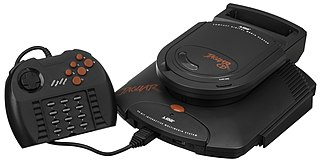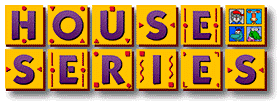
The Compact Disc-Interactive is a digital optical disc data storage format that was mostly developed and marketed by Dutch company Philips. It was created as an extension of CDDA and CD-ROM and specified in the Green Book specifications, co-developed by Philips and Sony, to combine audio, text and graphics. The two companies initially expected to impact the education/training, point of sale, and home entertainment industries, but CD-i eventually became best known for its video games.

The Sega CD, known as Mega-CD in most regions outside North America and Brazil, is a CD-ROM accessory for the Sega Genesis produced by Sega as part of the fourth generation of video game consoles. It was released on December 12, 1991, in Japan, October 15, 1992, in North America, and April 2, 1993, in Europe. The Sega CD plays CD games and adds hardware functionality such as a faster CPU and graphic enhancements such as sprite scaling and rotation. It can also play audio CDs and CD+G discs.

The TurboGrafx-16, known as the PC Engine outside North America, is a home video game console designed by Hudson Soft and sold by NEC Home Electronics. It was the first console marketed in the fourth generation, commonly known as the 16-bit era, though the console has an 8-bit central processing unit (CPU) coupled with a 16-bit graphics processor. It was released in Japan in 1987 and in North America in 1989. In Europe, the console is known as the PC Engine, after the Japanese model was imported and distributed in the United Kingdom and France from 1988. In Japan, the system was launched as a competitor to the Famicom, but the delayed United States release meant that it ended up competing with the Sega Genesis and later the Super NES.
Shovelware is a term for individual video games or software bundles known more for the quantity of what is included than for the quality or usefulness.

Mario Is Missing! is a 1993 educational game developed and published by The Software Toolworks for MS-DOS, Nintendo Entertainment System, and Super Nintendo Entertainment System, later released on Macintosh in 1994. The player controls Luigi, who must travel around the world to find and return stolen treasures as part of a quest to find his brother, Mario, who has been captured by Bowser. Mario Is Missing!, part of a series of educational Mario games, marked Luigi's first starring role in a video game, which would not occur again until 2001, when Luigi's Mansion was released for the GameCube.

The Miracle Piano Teaching System is educational software which uses a MIDI keyboard to teach how to play the piano. It was published in 1990 by The Software Toolworks for the Nintendo Entertainment System, Super NES, Macintosh, Amiga, Sega Genesis, and MS-DOS compatible operating systems.

Mario's Time Machine is an educational video game originally released for MS-DOS and then for the Nintendo Entertainment System and Super NES consoles. The Software Toolworks both developed and published the MS-DOS and Super NES versions in 1993, while the NES version was developed by Radical Entertainment and published by The Software Toolworks in 1994. The Microsoft Windows version was re-released as Mario's Time Machine Deluxe in 1996.

Mindscape was a video game developer and publisher. The company was founded by Roger Buoy in October 1983 in Northbrook, Illinois, originally as part of SFN Companies until a management buyout was completed in 1987. Mindscape went public in 1988 and was subsequently acquired in 1990 by The Software Toolworks, eyeing Mindscape's Nintendo license. When Toolworks was acquired by Pearson plc in 1994, Mindscape became the primary identity for the development group. Mindscape was then sold to The Learning Company in 1998 and bought out by Jean-Pierre Nordman in 2001, becoming headquartered in Boulogne-Billancourt, France. Following the poor performance of its products, Mindscape exited the video game industry in August 2011. Notable titles released by Mindscape include the MacVenture series, Balance of Power, Moonstone: A Hard Days Knight, Legend, Warhammer: Shadow of the Horned Rat, Warhammer: Dark Omen and Lego Island.

PC PowerPlay (PCPP) is Australia's only dedicated PC games magazine. PC PowerPlay focuses on news and reviews for upcoming and newly released games on the Microsoft Windows platform. The magazine also reviews computer hardware for use on gaming computers. The magazine is published by Future Australia.
Chessmaster was a chess-playing video game series, which is owned and developed by Ubisoft. It is the best-selling chess franchise in history, with more than five million units sold as of 2002.

The TurboDuo is a fourth-generation video game console developed by NEC Home Electronics and Hudson Soft for the North American market. The TurboDuo was test-marketed in Los Angeles in October 1992, before a nationwide rollout in May 1993. It is the North American version of the Japanese PC Engine Duo game console which was released in September 1991.

The Software Toolworks was an American software and video game developer based in Novato, California. The company was founded by Walt Bilofsky in 1980 out of his Sherman Oaks garage, which he converted into an office, to develop software for the Heathkit H89 microcomputer. It quickly expanded into video games, releasing Airport and MyChess in 1980; other notable games include Chessmaster 2000, Mavis Beacon Teaches Typing, and Mario Is Missing!. Toolworks merged with its distributor, Software Country, in 1986 and, after going public in 1988, acquired IntelliCreations, DS Technologies, and Mindscape. By 1994, Toolworks employed 600 people and had a revenue of US$150 million. In May that year, it was acquired by Pearson plc for $462 million, which converted it to bear the Mindscape identity by November.

The Chessmaster 4000 Turbo is a 1993 chess video game developed and published by The Software Toolworks. It is part of the Chessmaster series. An enhanced CD-ROM version was released in 1994.

The Amiga CD32 (stylized as Amiga CD32, code-named "Spellbound") is a 32-bit home video game console developed by Commodore and released in Europe, Australia, Canada, and Brazil. It was first announced at the Science Museum in London on July 16, 1993, and was released in September of the same year.

The Atari Jaguar CD is a CD-ROM peripheral for the Jaguar video game console.

Disney's Animated Storybook is a point-and-click adventure interactive storybook video game series based on Walt Disney feature animations and Pixar films that were released throughout the 1990s. They were published by Disney Interactive for personal computers for children ages four to eight years old. Starting from 1994, most of the entries in the series were developed by Media Station. They have the same plots as their respective films, though abridged due to the limited medium.

Early Learning House or simply the House Series is a collection of four main educational video games and two compilations for the Windows and Macintosh platforms, developed by Theatrix Interactive, Inc. and published by Edmark software. Each different game focuses on a particular major learning category with selectable skill settings for preschooler, kindergarten and elementary learners. Millie's Math House (1992) on mathematics, Bailey's Book House (1993) on language, Sammy's Science House (1994) on science, and Trudy's Time and Place House (1995) on history and geography. A spin-off, Stanley's Sticker Stories (1996), sees players create animated storybooks with the series' characters. Millie & Bailey Preschool and Millie & Bailey Kindergarten each contain the combined activities from two of the four software products. In addition the programs can be configured by an adult mode to suit students with special needs. Most of the activities in every game have two modes, one to allow learners to explore and try it out for themselves and the other for learners to follow specific tasks set by the game characters. Learners also have the option to print pictures of creative activities and record sounds in phonics activities. Later the games were re-developed by Houghton Mifflin Harcourt Learning Technology and re-published by The Learning Company with newer graphics and additional activities.

Star Wars Chess is a 1993 chess-playing video game developed by The Software Toolworks, based on the Star Wars film franchise and published by Mindscape for DOS, Sega CD and Windows 3.x. A 3DO Interactive Multiplayer version was planned but never released.

The San Diego Zoo Presents: The Animals is an educational game developed by Software Toolworks and Arnowitz Studios and published by Software Toolworks in 1992 for Windows. Arnowitz Studios developed the multimedia assets and Software Toolworks did the software development. A release for 3DO was planned for release in November 1993 but was ultimately launched in 1994. The game was then ported to Sega CD in 1994.

The Mario's Early Years! series is a trilogy of point-and-click educational games released on MS-DOS and Super Nintendo Entertainment System by Software Toolworks. The three games consist of Fun with Letters, Fun with Numbers and Preschool Fun.


















